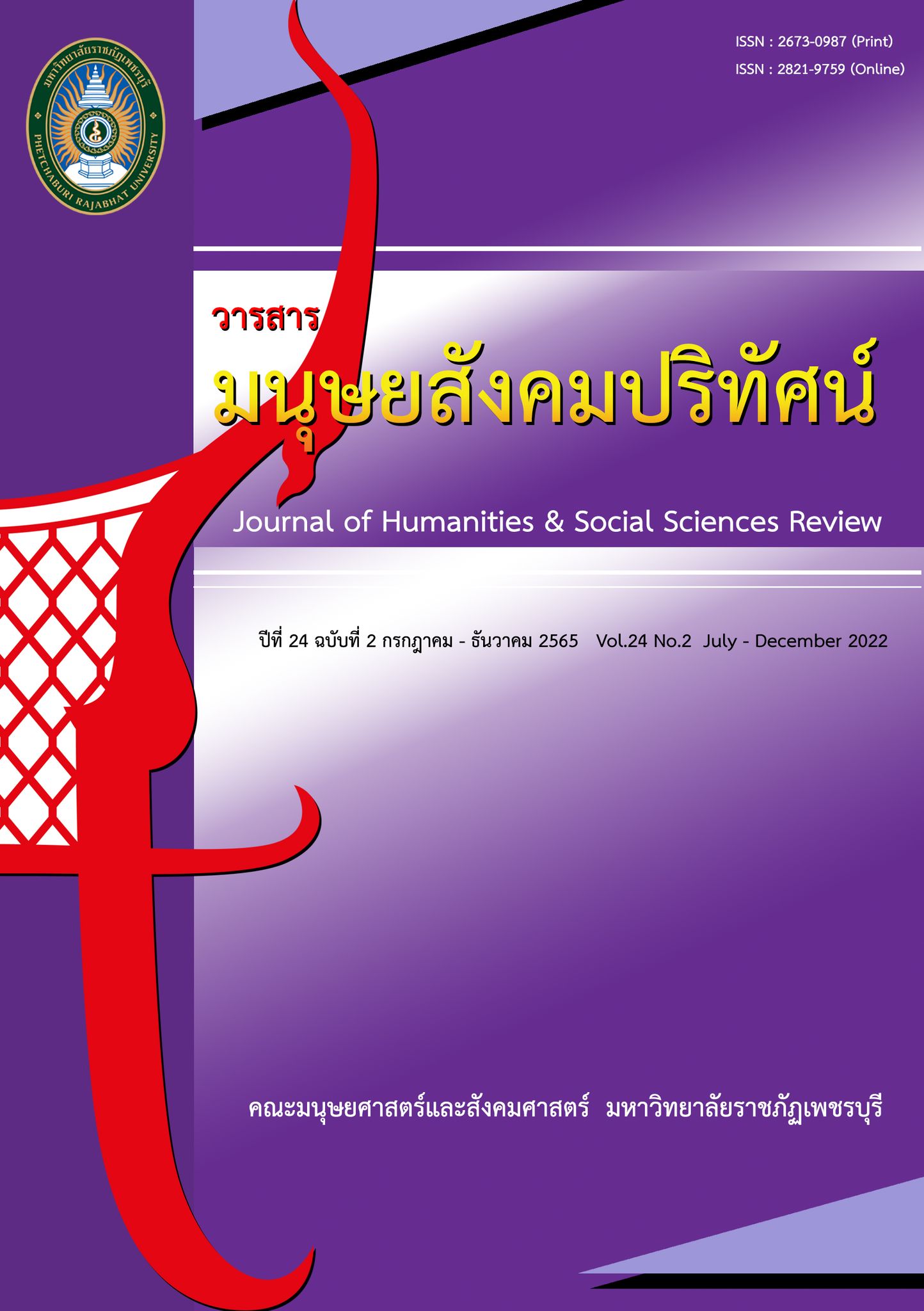การนิเทศนักศึกษาฝึกประสบการณ์วิชาชีพครูเพื่อออกแบบการเรียนรู้วิชาภาษาไทยในสถานการณ์แพร่ระบาดโรคติดเชื้อไวรัสโคโรนา 2019
Main Article Content
บทคัดย่อ
การวิจัยครั้งนี้มีวัตถุประสงค์เพื่อศึกษารูปแบบการนิเทศและออกแบบการเรียนรู้วิชาภาษาไทยของนักศึกษาฝึกประสบการณ์วิชาชีพครูสาขาวิชาภาษาไทย คณะมนุษยศาสตร์และสังคมศาสตร์ มหาวิทยาลัยราชภัฏเพชรบุรี ในสถานการณ์แพร่ระบาดโรคติดเชื้อไวรัสโคโรนา 2019 ซึ่งเป็นการวิจัยเชิงคุณภาพ กลุ่มเป้าหมาย คือ นักศึกษาฝึกประสบการณ์วิชาชีพครู สาขาวิชาภาษาไทย ภาคการศึกษาที่ 1 ปีการศึกษา 2564 ผลการวิจัยพบว่าการออกแบบการนิเทศนักศึกษาฝึกประสบการณ์วิชาชีพครูโดยบูรณาการกับแนวคิดชุมชนแห่งการเรียนรู้ทางวิชาชีพ สามารถสรุปเป็นรูปแบบการนิเทศได้ 3 ขั้น คือ ขั้นที่ 1 ขั้นสร้างชุมชนการเรียนรู้ครูภาษาไทย ขั้นที่ 2 ขั้นพัฒนาชุมชนครูภาษาไทยมืออาชีพ และขั้นที่ 3 ขั้นประเมินผลชุมชนการเรียนรู้ครูภาษาไทย และความสามารถในการออกแบบการจัดการเรียนการสอนวิชาภาษาไทย โดยคำนึงถึง 3 ประเด็นหลักดังนี้ ประเด็นที่ 1 บทบาทครู ในฐานะผู้อำนวยความสะดวก ประเด็นที่ 2 การจัดการเรียนการสอน คือ การจัดตารางเรียนแบบยืดหยุ่น ใช้วิธีสอนตามแนวคิดการสอนเน้นสมรรถนะ และประเด็นที่ 3 เนื้อหาวิชาภาษาไทย แบ่งเป็น 3 เนื้อหาหลัก คือ ทักษะการใช้ภาษาไทย หลักการใช้ภาษาไทยและวรรณคดี วรรณกรรมไทย ที่เน้นการสอนในรูปแบบออนไลน์และมีเป้าหมายให้นักเรียนเห็นคุณค่าของเนื้อหาที่เรียนโดยการโยงเข้ากับการนำไปใช้ในชีวิตประจำวันเป็นประเด็นสำคัญ
Article Details
1. มุมมองและความคิดเห็นใด ๆ ในบทความเป็นมุมมองของผู้เขียน คณะบรรณาธิการไม่จำเป็นต้องเห็นด้วยกับมุมมองเหล่านั้นและไม่ถือเป็นความรับผิดชอบของคณะบรรณาธิการ ในกรณีที่มีการฟ้องร้องเกี่ยวกับการละเมิดลิขสิทธิ์ ให้ถือเป็นความรับผิดชอบของผู้เขียน แต่เพียงผู้เดียว
2. ลิขสิทธิ์บทความที่เป็นของคณะมนุษยศาสตร์และสังคมศาสตร์ มหาวิทยาลัยราชภัฏเพชรบุรีมีลิขสิทธิ์ถูกต้องตามกฎหมาย การเผยแพร่จะต้องได้รับอนุญาตโดยตรงจากผู้เขียนและมหาวิทยาลัยราชภัฏเพชรบุรีเป็นลายลักษณ์อักษร
เอกสารอ้างอิง
กระทรวงศึกษาธิการ. สำนักงานคณะกรรมการการศึกษาขั้นพื้นฐาน. สำนักพัฒนาครูและบุคลากรการศึกษาขั้นพื้นฐาน. (ม.ป.ป.). คู่มือประกอบการอบรมการขับเคลื่อนกระบวนการ PLC (Professional Learning Community) “ชุมชนการเรียนรู้ทางวิชาชีพ” สู่สถานศึกษา. กรุงเทพฯ: ผู้แต่ง.
จังหวัดเพชรบุรี. (2564). คำสั่งจังหวัดเพชรบุรี ที่ 1/2564 เรื่อง ให้สถานศึกษาในสังกัดและในกำกับกระทรวงศึกษาธิการ และในสังกัดองค์กรปกครองส่วนท้องถิ่น ปิดเรียนด้วยเหตุพิเศษ. สืบค้นเมื่อ 1 มีนาคม 2564, จาก http://www.phetchaburi.go.th/phet2/CODE/files/1609727250_1-2564.pdf.
ณิรดา เวชญาลักษณ์ และคณะ. (2562). แนวทางการพัฒนาครูพี่เลี้ยงและอาจารย์นิเทศเกี่ยวกับการหนุนเสริมด้วยการ “Coaching” และชุมชนการเรียนรู้ทางวิชาชีพ. วารสารศึกษาศาสตร์ มหาวิทยาลัยศิลปากร. 17(2): 143-162.
ดนุลดา จามจุรี. (2563). การออกแบบการเรียนรู้สำหรับผู้เรียน Gen Z. กรุงเทพฯ: บัณฑิตวิทยาลัยมหาวิทยาลัยศรีนครินทรวิโรฒ.
ปรณัฐ กิจรุ่งเรือง และอรพิณ ศิริสัมพันธ์. (2561). ชุมชนแห่งการเรียนรู้ (Professional Learning Community : PLC) กลยุทธ์การยกระดับคุณภาพการศึกษา: แนวคิดสู่การปฏิบัติ. กรุงเทพฯ: M&N Design Printing.
ราชบัณฑิตยสถาน. (2551). พจนานุกรมศัพท์ศึกษาศาสตร์ อักษร A-Z ฉบับราชบัณฑิตยสถาน. กรุงเทพฯ: อรุณการพิมพ์.
สุรภี รุโจปการ (บรรณาธิการ). (2563). ศาสตร์ สอน สื่อ สุข. กรุงเทพฯ: ภาควิชาหลักสูตรและการสอน คณะครุศาสตร์ จุฬาลงกรณ์มหาวิทยาลัย.
Jurenka, R., Starecek, A., Vranakova, N., & Caganova, D. (2018). The learning styles of the generation group Z and their influence on learning results in the learning process. 16th IEEE International Conference on Emerging eLearning Technologies and Applications (ICETA) November 15-16: 251-259.
Lassoued, Z., Alhendawi, M., & Bashitialshaaer, R. (2020). An exploratory study of the obstacles for achieving quality in distance learning during the COVID-19 pandemic. Education Sciences, 10(232): 1-13.
Nadeak, B. (2020). The effectiveness of distance learning using social media during the pandemic period of COVID-19: A case in Universitas Kristen Indonesia” International Journal of Advanced Science and Technology, 29(7): 1764-1772.
Nicholas, A.J. (2020). Preferred learning methods of generation Z. Retrieved January 17, 2021, from https://www.who.int/news-room/detail/27-04-2020-who-timeline---covid-19.
WHO. (2021). COVID-19 weekly epidemiological update. Retrieved March 1, 2021, from https://www.who.int/publications/m/item/weekly-epidemiological-update---5-january-2021.


